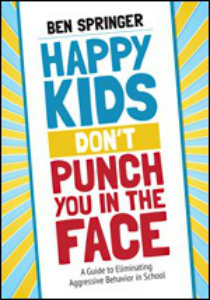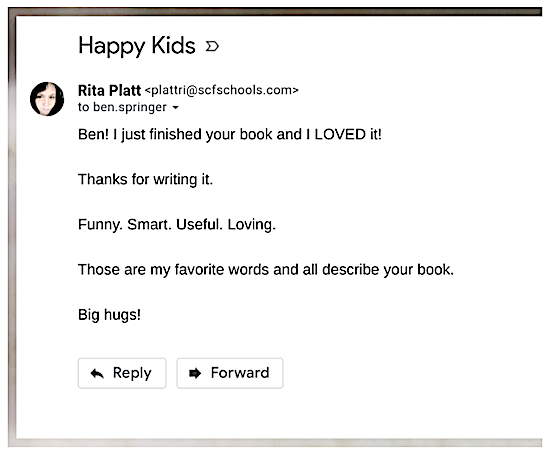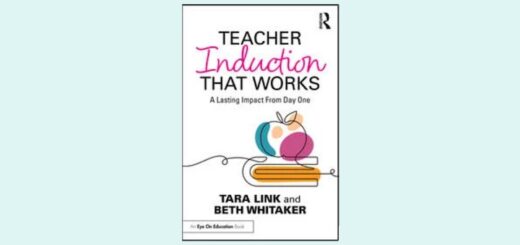Happy Kids Don’t Punch You in the Face
Happy Kids Don’t Punch You in the Face: A Guide to Eliminating Aggressive Behavior in Schools
By Ben Springer, PhD, NCSP
(Corwin, 2018 – Learn more)
 Reviewed by Rita Platt
Reviewed by Rita Platt
You know it’s a great book when you can’t wait to talk to the author and thank him for the gift he gave by writing it.
That’s the kind of book school psychologist Ben Springer has written. Happy Kids Don’t Punch You in the Face: A Guide to Eliminating Aggressive Behavior in Schools so touched me that I was moved to email Springer as soon as I turned the last page.
That email led to a nice exchange between the author and me that redoubled my feeling that Springer’s voice is one that needs to be heard in today’s efforts to help educators be more mindful of how to serve our students who, for one reason or another, exhibit extreme behaviors in school.
The Big Idea
Working educators all over the nation are dealing with challenging behaviors, and for many of us these behaviors seem more extreme and aggressive each year. There are tools and strategies that can help educators help kids decrease undesirable behaviors and live happier lives.

- identify the roots of aggression.
- offer strategies to prevent aggression.
- help educators respond safely to student aggression.
- foster compassionate relationships with students.
- help schools adapt to the needs of students with extreme behaviors.
Each chapter is full of easy-to-understand and fascinating (and sometimes counterintuitive) research and theory, tools and resources for immediate implementation of ideas, and case studies.
Just as important, for me anyway, each chapter is also sprinkled with a heady quantity of humor. You know what? Teaching is hard. It’s even harder when we have kiddos who ask for the help they need in the worst of ways. If we don’t laugh, it’s gonna be a long year….
The Chapters
The book begins with an introduction that tells the harrowing true story of extreme behavior known as the Thanksgiving “Lentil Incident” (yes, it’s just as terrifying as it sounds) and it ends with a conclusion that offers a “where are they now” roundup of what happened to the kids and teachers in the case studies.
In between are seven information-filled chapters designed to help educators meet the goals listed above. Below is a very brief summary of each.
Chapter 1: The Roots of Aggression and the Coercive Cycle
Here Springer shares the research on aggressive behaviors and the findings that point to a combination of nature and nurture factors, writing “While the nature-versus-nurture debate is an interesting one, modern-day thought and practice have left us with a nice big Jackson Pollock-esque picture of aggression in children” (p. 9).
That said, even if it’s a part of a person’s genetic make-up, we can ameliorate aggression by working to break the “coercion cycle” where we inadvertently reinforce aggressive behaviors.
Chapter 2: What Does Not Work
Twenty-five years into teaching and fourteen into parenting, I still need reminders to abandon (and re-abandon) discipline strategies that simply don’t work. Springer helps us remember to just say no to corporal punishment, suspension (with rare exception), and reprimands, especially the public kind.
Chapter 3: The Triangle of Power
This will be very familiar to educators who use a multi-tiered system of support for academics (RTI) or behavior (PBIS) in their schools. The chapter offers a summary of each tier along with tools and strategies to help screen for student needs and prevent aggression when possible.
Chapter 4: Happy Kids Don’t Punch You in the Face
Chapter four takes readers on a journey through the positive psychology movement and shares strategies to help kids stay happy in schools through helping build the “pillars of happiness” (p. 44) with RICH (building their Resources, Intimate connections, Competence, and Health). This chapter resonates for me, as my own 2019 book is all about helping schools develop such that all are Working Hard, Working Happy.
Chapter 5: Principles of Applied Behavior Analysis
Here we learn how to get to the root of aggressive and other problem behaviors so we can develop plans that meet students’ needs before they act out. This chapter is power-packed with practical tools and helped me simplify my own thinking about how to develop helpful plans for the kids I serve.
Chapter 6: Optimistic Teaming
Working with troubled children can be, well, troubling for educators. Chapter 6 helps readers get a handle on their own feelings and develop strong, supportive, and optimistic school teams to help make positive change possible. I love Springer’s reminder that optimism is a non-negotiable prerequisite for success as well as his list of the “battlefronts” against optimism. He helps team leaders watch for low sense of self-efficacy, worry about what others might think of us, blaming impulses, and other pessimistic thoughts and actions that can make it impossible to help an aggressive child.
Chapter 7: Bringing It All Together
This chapter, as promised in the title, brings all of ideas together. It offers strategies for staying on the right side of the law when working with challenging students, on how to frame your thinking such that you offer students empathy, and on how to troubleshoot plans that don’t seem to be working.
You Will Like This Book!
Springer’s tone is wonderful. This book finds the perfect balance between sharing practical, compassionate strategies with support for teachers, allowance for imperfection, and, as I already mentioned, opportunity to laugh at it all. I mean, when the chapters open with quotes from diverse voices such as Martin Luther King Jr and Ben Franklin to Dory (from Finding Nemo) and The Big Lebowski, you know the book going to be good!
I highly recommend Happy Kids Don’t Punch You in the Face to any and all educators who wish to work to help ALL students be successful in their schools. It is a nice fit with almost any positive behavior management (I know, I know, that term is out of vogue) you already have in place.
Rita Platt (@ritaplatt) is a National Board Certified Teacher with master’s degrees in reading, library, and leadership. Her experience includes teaching learners in remote Alaskan villages, inner cities, and rural communities. She currently is a school principal, teaches graduate courses for the Professional Development Institute and blogs at Heart of the School for MiddleWeb. Her book, Working Hard, Working Happy: Cultivating a Culture of Effort and Joy in the Classroom, launched in early July.






























